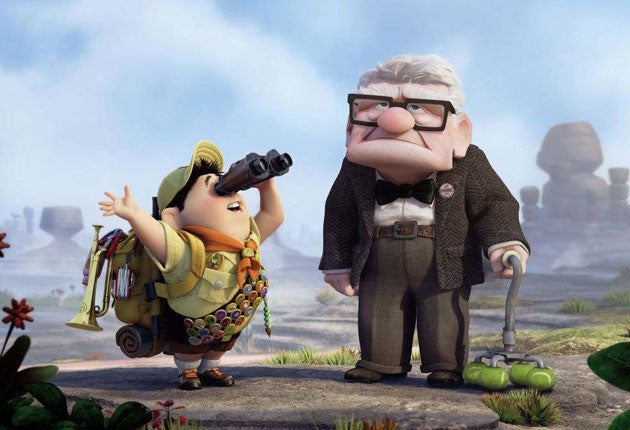Your support helps us to tell the story
From reproductive rights to climate change to Big Tech, The Independent is on the ground when the story is developing. Whether it's investigating the financials of Elon Musk's pro-Trump PAC or producing our latest documentary, 'The A Word', which shines a light on the American women fighting for reproductive rights, we know how important it is to parse out the facts from the messaging.
At such a critical moment in US history, we need reporters on the ground. Your donation allows us to keep sending journalists to speak to both sides of the story.
The Independent is trusted by Americans across the entire political spectrum. And unlike many other quality news outlets, we choose not to lock Americans out of our reporting and analysis with paywalls. We believe quality journalism should be available to everyone, paid for by those who can afford it.
Your support makes all the difference.Staying true to its tradition of showcasing how the popcorn-scoffing masses will be entertained in years to come, the Cannes Film Festival opened with one of Hollywood's boldest declarations of intent since they sacked picture house orchestras and ushered-in the era of the "talkie".
The Disney cartoon Up swept into the French Riviera last night, making cinematic history as both the first animation, and the only 3D film, to have been selected as the curtain-raiser for the prestigious 62-year-old event.
Festival audiences who want to watch the tale of a grumpy pensioner who escapes the daily grind by attaching helium balloons to his rickety house and floating away to South America, will for the next fortnight be required to replace their Ray-Ban sunglasses with rubberised wraparound spectacles.
It remains to be seen if the increased visual depth will strike a chord with the notoriously picky Cannes jury, this year led by the French actress Isabelle Huppert, and including the novelist Hanif Kureishi and Sean Penn's soon-to-be ex-wife Robin Wright Penn.
The film must compete with Quentin Tarantino's eagerly awaited Second World War film Inglourious Basterds, as well as entries by Lars Von Trier, Ken Loach, Ang Lee and Pedro Almodovar.
However, among the powerbrokers who flock to Cannes each May, Up's place in history has been sealed. Its premiere was heralded by Variety yesterday as the defining moment when 3D movie-making stopped being a technological gimmick, and moved squarely into the cinematic mainstream.
Hollywood has recently bet big on 3D, investing billions in updating cinemas and green-lighting dozens of big-budget 3D productions from directors like Robert Zemeckis, Steven Spielberg, Tim Burton, George Lucas and Peter Jackson. James Cameron's 3D title Avatar is tipped as a Christmas blockbuster. Jeffrey Katzenberg, chief executive of Dreamworks, describes 3D as the third great "revolution" in the history of film, after the arrival of sound in the 1920s and colour in the 1930s.
One reason for their bullishness is that 3D gives a new reason for the public to leave their plasma-screened living rooms and troupe out to the cinema. Another is that audiences are happy to pay a premium, sometimes as much as £5 a ticket, to attend a 3D film.
In an era of increasing piracy, highlighted by the leaking of the most recent X-Men film, 3D is also virtually impossible to illegally record, without either stealing a master copy of the film or using a pair of video cameras fitted with hi-tech lenses.
The entertainment industry expects 3D technology to move into television, particularly in the realm of live sports. "If you've ever seen a 3D television demonstrated, it's one of those jaw-dropping 'Oh I want that' moments," says David Cohen, of Variety. "It instantly inspires techno-lust."
Disney will release Up in 2,000 specially fitted American cinemas later this month; a standard version will be carried on other screens.
The first 3D movies were screened at the Astor Theatre in New York in 1915, but the technology has remained a minority taste. A flurry of titles released in the 1950s, requiring viewers to wear red-and-blue cardboard glasses, often left audiences seasick and with throbbing headaches.
Further efforts in the 1980s, including a 3D Jaws film and A Nightmare on Elm Street, concentrated on overawing viewers with new technology rather than entertaining them. The new 3D films are different. "They aren't about trying to make you sit back in your chair because you think someone's about to reach out of the screen to poke you," says Jamie Graham of Total Film. "It's more about increasing depth, and making the experience of watching the film more like peering into a window. That's why Peter Jackson and Spielberg and all these great directors love it. They see film-making as storytelling, and making you see on screen what you see with your real eyes is part of that."
The UK has 171 3D screens, more than any country in the world outside the US. The drawback: thanks to the joys of Disney's international distribution schedule, Up won't be released here until October.

Join our commenting forum
Join thought-provoking conversations, follow other Independent readers and see their replies
Comments